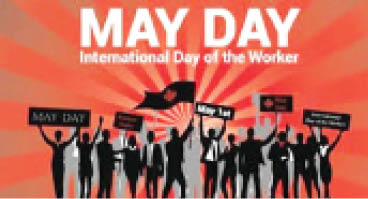Nigerian workers deserve better
Today, May 1, is observed as May Day, Workers’ Day or International Workers’ Day, a day that commemorates the struggles and gains made by workers and the labour movement. Observed in over 160 countries of the world, it is also an occasion to commemorate and thank workers and labourers across the world for all the […]

nlc
Today, May 1, is observed as May Day, Workers’ Day or International Workers’ Day, a day that commemorates the struggles and gains made by workers and the labour movement. Observed in over 160 countries of the world, it is also an occasion to commemorate and thank workers and labourers across the world for all the work that they do.
It has become a day for workers to come together and demand better working conditions, fair wages and other labour rights, just as other people come together to demand a more equitable society for all.
May Day was first celebrated on May 1, 1890, when the International Congress of Socialist Parties in Europe declared May 1st as the ‘Workers Day of International Unity and Solidarity.’ In 1904, the Sixth International Socialist Congress called for all workers, trade unions and social democratic organisations to ‘demonstrate energetically on the First of May for the legal establishment of the eight-hour day, for the class demands of the proletariat, and for universal peace.’
The date, May 1st, was chosen because, in the United States, the eight-hour workday first came into effect on that date in 1886, following the fulfilment of the demands of the Federation of Organized Trades and Labour Unions, which organised a general strike that resulted in the Chicago Haymarket Square riot and the eventual adoption of the eight-hour workday.
- Gunmen kidnap Benue varsity staff member, wife, 4 siblings
- Electricity Tariff hike: You’ve Failed Nigerians, Falana Blasts Power Minister
Workers’ Day was first recognised as a public holiday in Nigeria by the Peoples Redemption Party (PRP) governments of Kano and Kaduna states in 1980, but officially became a national holiday on May 1st, 1981 under the National Party of Nigeria (NPN) administration of President Shehu Shagari.
In Nigeria, labour unions and other worker organisations hold parades, rallies and other events in Abuja and capitals of states across the country, as the President of the Nigeria Labour Congress (NLC), President of Trade Union Congress (TUC) and other labour leaders address workers.
We congratulate workers in Nigeria for marking this day, just as we hail them for all that they do for the growth and development of the country.
Today’s Workers Day is taking place in a gloomy economic situation. Indeed, Nigerian workers have not had it this bad in a long time. From a botched currency redesign to the removal of fuel subsidy and a currency float, these policies, including the increase in electricity tariff, have inflicted untold hardships on Nigerians that no government intervention has been able to tackle.
Since the removal of subsidy, Nigeria has been plunged into an economic crisis with far-reaching consequences on the populace, including the workers.
The annual inflation rate rose to 33.20 per cent in March, from 31.70 per cent in February, according to the National Bureau of Statistics (NBS). This is the highest inflation rate in nearly three decades. Also, the food inflation rate in March 2024, quickened to 40.01 per cent on a year-on-year basis, 15.56 per cent points higher than the rate recorded in March 2023 (24.45 per cent).
The resulting increase in prices of goods and services has weakened the purchasing power of workers, making it difficult for many homes to afford daily meals. And the situation is compounded by the insecurity situation, which has led to killings and kidnapping for ransom.
There have been protests by workers over the economic and security situation, but they have been largely ineffective, especially with the refusal of the federal government to increase wages or even improve access to public utilities.
The federal and state governments have failed to uphold their pledges to soften the impact of the reforms. The welfare of workers has become empty talk, as despite a series of meetings and setting up of committees, nothing concrete has been done.
We, at Daily Trust, urge the federal government to, as a matter of urgency, step in, along with the state governments and address the depressing economic and security situation in the country. They should walk their talk. Today’s situation calls for a better deal for Nigerian workers. Indeed they deserve better welfare.
Towards this, we urge the federal and state governments to urgently implement the palliatives as announced in July 2023 by President Bola Ahmed Tinubu, to ease the pains of workers. These include the full and quick implementation of a new national minimum wage to boost workers’ welfare. They should also actualise the food price stabilization measures needed to reduce the cost of basic needs. Also, the N100 billion scheme for 3,000 units of 20-seater Compressed Natural Gas (CNG) buses to ease transportation, should not wait a day longer.
The federal government should also provide the N125 billion in funding for Micro, Small, and Medium-Sized Enterprises (MSMEs) and the 9% interest for 100,000 SMEs and startups intended to boost employment. The promise was made some time ago. It is time to implement it.
As we salute the resilience of Nigerian workers and urge them to continue to improve on their productivity. The federal and state governments must give the workers living wages so they can live decent lives, along with their families. Indeed, Nigerian workers deserve a new deal and the time is now. We wish all Nigerian workers, a happy May Day.
